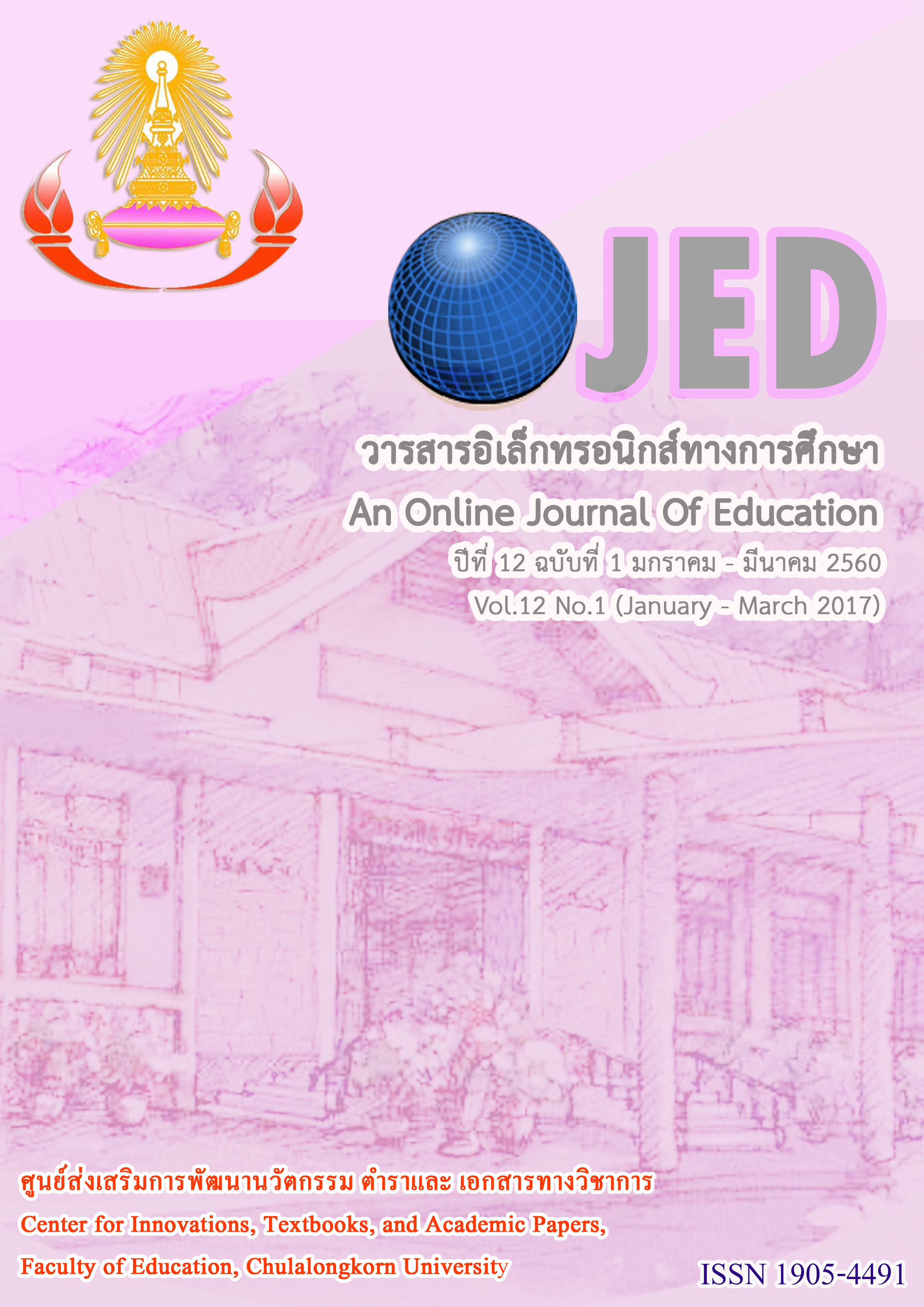ผลของการพัฒนาการรู้ซึ้งถึงความรู้สึกของนักเรียนระดับชั้นมัธยมศึกษาปีที่ 2
Keywords:
การรู้ซึ้งถึงความรู้สึก, การพัฒนาการรู้ซึ้งถึงความรู้สึก, EMPATHY, EMPATHY DEVELOPMENTAbstract
งานวิจัยครั้งนี้มีวัตถุประสงค์เพื่อ 1) เปรียบเทียบคะแนนการรู้ซึ้งถึงความรู้สึกของกลุ่มทดลอง ในระยะก่อนการทดลอง หลังการทดลองและระยะติดตามผล ภายหลังการเข้าร่วมโปรแกรมพัฒนาการรู้ซึ้งถึงความรู้สึก 2) เปรียบเทียบคะแนนการรู้ซึ้งถึงความรู้สึกระหว่างกลุ่มทดลองกับกลุ่มควบคุม ในระยะก่อนการทดลอง หลังการทดลอง และระยะติดตามผล ภายหลังการเข้าร่วมโปรแกรมพัฒนาการรู้ซึ้งถึงความรู้สึก ตัวอย่างวิจัย ได้แก่ นักเรียนระดับชั้นมัธยมศึกษาปีที่ 2 โรงเรียนสุรศักดิ์มนตรี ภาคการศึกษาที่ 1 ปีการศึกษา 2559 จำนวน 88 คน แบ่งออกเป็น 2 ห้องเรียน ห้องละ 44 คน ได้แก่ นักเรียนกลุ่มทดลองที่ได้เข้าร่วมกิจกรรมตามโปรแกรมพัฒนาการรู้ซึ้งถึงความรู้สึก และนักเรียนกลุ่มควบคุมที่ไม่ได้เข้าร่วมกิจกรรมตามโปรแกรมพัฒนาการรู้ซึ้งถึงความรู้สึก ใช้เวลาในการดำเนินกิจกรรมครั้งละ 50 นาที รวมทั้งสิ้น 12 ครั้ง โดยให้นักเรียนทั้ง 2 กลุ่มตอบแบบประเมินการรู้ซึ้งถึงความรู้สึกในระยะก่อนการทดลอง หลังการทดลอง และระยะติดตามผล เครื่องมือที่ใช้ในการวิจัย ประกอบด้วย 1) โปรแกรมพัฒนาการรู้ซึ้งถึงความรู้สึก 2) แบบประเมินการรู้ซึ้งถึงความรู้สึก วิเคราะห์ข้อมูลด้วยสถิติการวิเคราะห์ความแปรปรวนแบบวัดซ้ำ และการทดสอบค่าที
ผลการวิจัยพบว่า 1) นักเรียนกลุ่มทดลองมีค่าเฉลี่ยคะแนนการรู้ซึ้งถึงความรู้สึกในระยะหลังการทดลอง และระยะติดตามผล สูงกว่าก่อนการทดลอง อย่างมีนัยสำคัญทางสถิติที่ระดับ .01 2) นักเรียนกลุ่มทดลองมีค่าเฉลี่ยคะแนนการรู้ซึ้งถึงความรู้สึกในระยะหลังการทดลอง และระยะติดตามผล สูงกว่านักเรียนกลุ่มควบคุม อย่างมีนัยสำคัญทางสถิติที่ระดับ .05
The purposes of this study were 1) to compare mathayomsuksa 2 students’ empathy before and after attending an empathy development program, and 2) to compare mathayomsuksa 2 students’ empathy before and after attending the empathy development program between an experimental group and a control group. The samples of this study were 88 mathayomsuksa 2 students of Surasakmontree School in Bangkok who studied in the first semester of academic year 2015. The samples were randomly divided into 2 groups: the experimental group attended the empathy development program and the control group did not. The empathy development program involved 12 training sessions with each session lasting 50 minutes. A Pretest, posttest and follow-up test were administrated. The research instruments included 1) the empathy development program, and 2) the empathy scale. One - Way Repeated Measures (ANOVA) and Independent T-Test were employed for data analysis.
The results demonstrated that 1) the posttest and follow-up test scores on the empathy scale of the experimental group were significantly higher than their pretest scores at p < .01 2). The posttest and follow-up test scores on the empathy scale of the experimental group were significantly higher than the scores of control group scores at p < .05.




